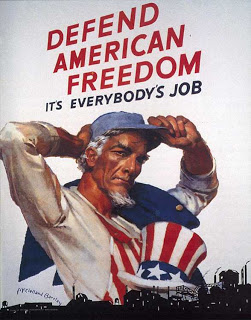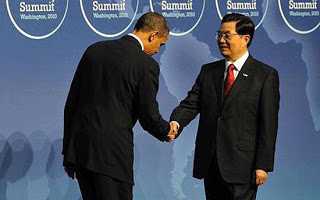America Has No Foreign Policy
By Daniel Greenfield
SultanKnish.Blogspot.com
The United States of America has a State
Department, it has row after row of people who speak
badly every language from Arabic to Swahili badly,
and it has rich donors who take on the task of
acting as ambassadors to some foreign country every
four to eight years. There are think-tanks, actual
tanks and institutes dedicated to turning out papers
on foreign policy. And despite all this, or perhaps
because of all this, the country still has no
foreign policy.
Americans are by nature isolationist. American
leaders, since Woodrow Wilson dumped ashes from his
pipe on the Oval Office carpets and dumped America
into the international game of empires, are bent on
getting involved in world politics. Unfortunately
everything they know about world politics comes from
the back of cereal boxes. And yes that includes our
current precious genius who comes to us from eating
dog and living the life of a privileged member of
Indonesia's upper classes, but knows almost as
little about the world outside Chicago, as he does
about economics.
The big problem with American foreign policy is that
there isn't one. Our current foreign policy can be
boiled down to three words. "Don't Hate Us." The
current administration has introduced an innovative
fourth word. "Please."
It's a long way from a century ago when American
leaders still had no foreign policy, besides warning
European countries to stay out of their hemisphere,
but had begun to think that being involved in the
affairs of other countries was a prerequisite for
global good citizenship.
Theodore Roosevelt won a Nobel Prize for trying to
get the Russians and Japanese to end a disastrous
war in which the Japanese had the suicide
determination and the Russians had the machine guns,
but barely broke even.
Roosevelt, like many of his successors, had no true
foreign policy beyond articulating American
greatness on the world stage. But the deeper those
successors involved themselves in international
politics, the more they came to see American
greatness as the obstacle, not the point. The more
the United States became involved in organizing
global alliances to hold back one threat or another,
the more that same national greatness began to be
seen as an obstacle to maximizing those alliances.
A hundred years ago, American presidents thought
that their country should be a world power because
of the manifest destiny of its national greatness. A
century later they were minimizing that national
greatness to preserve world power status.
Roosevelt's "Pedicaris alive or Raisuli dead" became
"Let's Pull Together" and "Don't Hate Us" during the
Cold War. And today the motto, in a world where a
whole lot of people want to do it, is, "Please Don't
Kill Us."
The United States does not appease in pursuit of its
objectives, appeasement has become the objective.
Being hated is the ultimate national security
threat. Being loved is the ultimate national
security objective. These aren't even sarcastic
observations. They are actual policy.
CVE (Countering Violent Extremism) through outreach
to Muslims is our foreign policy and like global
warming and gay rights, it encompasses every single
area of our government, to the absurd extent that
NASA's top priority under the dog-eater-in-chief was
designated as improving Muslim self-esteem. NASA's
former priority of boosting American self-esteem was
no longer appropriate because that would just make
people hate us even more and make us act in such a
way that they would hate us.
Americans and American leaders now both want the
same thing. To be left alone. But American leaders
remain convinced that the best way to be left alone
is to appease those who might want to attack their
country by minimizing national power and
contributing more lunch money to their international
cause of free lunches.
America is often accused of bullying other nations,
but our policies are not those of a bully, they are
those of his victim cowering in the corner with
broken glasses and smeared tears, one hand extended
with his crumpled up lunch money inside. Our lunch
money total comes into the many billions, but as our
bullies and their advocates remind us, we're rich
enough to be able to afford it.
The kid in the corner has been bullied enough
that his only policy is avoiding another incident.
That is our foreign policy, driven by CVE or Here's
Some More Halal Lunch Money, finding ways of getting
the bullies to leave us alone. Even the more
militant elements of our military campaign are
defensive, ripe with ways to convince the bullies to
leave us alone, using drones to minimize civilian
casualties and nation building exercises to turn our
bullies into friendly peaceloving countries.
Reactive foreign policies are a recipe for defeat,
but America has never had any foreign policy beyond
progressive world citizenship and coalition building
against global threats. And that has made American
into the world's social worker and the world's
policeman for so long that it has hardly any sense
of what it might want for itself, as a country.
America is still involved in global citizenship
projects even though the dictatorships who are the
plurality of the global polity and the progressives
who define global citizenship innately hate it.
while working hard at maintaining global coalitions
that do not exist against a threat that not even it
is prepared to name. Whatever relevance these had,
they no longer have any relevance when the
conventional clash of nations of the Cold War gave
way to the ride of the barbarians in the Islamic
Wars of Terror.
The United States has been suckered into playing the
same game as Israel. The impossible game of winning
wars without alienating anyone. And that game is
played by not winning wars and being more hated than
if they had won all those wars. If we are forced to
fight because we are hated, then the only way to
avoid fighting is not be hated which means fighting
just enough to survive, but not enough to earn us
any more than the minimum amount of hate balanced
against the minimum amount of survival. And if we
win, maybe they'll leave us alone. If they don't,
we'll fight back even less.
During the Cold War the United States sacrificed its
economy, its trade balance and its manufacturing
sector to score coalition points and contain
Communism. With Communism defeated and capitalism
thriving in Russia and China, the United States is
now stripping away civil liberties to counter
Islamic terrorism. But that doesn't just mean strip
searches in airports, it means outlawing anything
that offends Muslims. And if we survive that, and
the Muslim world becomes a mecca of free speech,
then we'll have won yet another Pyrrhic victory at
our own expense.
Countering external threats is a legitimate foreign
policy interest, but it cannot be the only interest.
That way leads to a purely reactive foreign policy
and down the garden path to Stockholm Syndrome
politics that accept responsibility for the actions
of an aggressor to maintain the illusion of control
over his actions. Our leaders, the ones who eat dogs
and the ones who just pose for photos with them, are
already there. If we reach European critical
velocity, then we'll be there as an entire nation,
not just members of our chattering and spending
classes.
America needs a foreign policy that is bigger than
its defensive needs but smaller than progressive
ambitions of global citizenship. It is a foreign
policy that cannot be defensive or altruistic, but
that actually resurrects the long buried question of
American interests, rather than American obligations
or needs. And to get there, the country's
policymakers have to get in touch with their 19th
Century selves and stop asking what America is
obligated to do for the world or what it desperately
needs from the world, but what it would like to do
with the world.
That is the way that Russia or China think. It's
the way that most countries, from the largest rivals
to the smallest islands, approach the outside world,
not as a place that they are obligated to or whom
they dare not offend, but as a place for extending
their ambitions and sense of self into. That does
not mean going on a spree of territorial
expansionism, necessarily, but that too would be a
healthier way to function than the listless apathy
of appeasement that has overtaken American foreign
policy.
A foreign policy is assertive. It seeks to gain
things, rather than to minimize losing things. It is
not as concerned with the feelings of the world, as
it is with the feelings of its own citizens. To the
question of what it wants, it does not answer with
the time-honored response of Miss America
contestants, to make the world a better place, but
rather it answers to make America better, bigger,
richer and stronger. That answer is not idealistic,
it is realistic. It is how other countries expect us
to think and it is how they react no matter how
altruistic our policies may be.
American foreign policy needs goals and horizons to
gain definition. It needs to want something more
than a way to avert the next big explosion or to
feed the hungry people of Warlordistan to have a
foreign policy that is based on substance, rather
than cobwebs of fears and dreams. It needs to stand
not for a better world, but for a better, stronger
and richer America.




